- Home
- Nancy Buckingham
The Jade Dragon Page 6
The Jade Dragon Read online
Page 6
* * * *
I awoke to pitch darkness. The fire had died to ashes, so I could tell it was far into the night. Everything was hushed, but I knew that some sound had disturbed me.
Then I heard it again, the faint creak of the door. A sliver of light fell across the carpet. I sat up, tense with alarm. Who would come to my room stealthily, in the small hours? For what possible reason? The shaft of light broadened as the door opened wider, and I saw a two-branched candelabra held aloft. It was borne by a small ghostly figure in a white nightgown. Then I saw who it was and felt a wave of relief.
“Grandmama. What is it?” I whispered softly.
She gave no answer but advanced toward me, moving rather stiffly. Holding the blankets up to my chin, I watched her wonderingly, sensing something strange. She drew closer until she was right beside the bed and stood gazing down at me. Then she lifted the silver-gilt candelabra still higher and held it poised above my head—as though she intended to bring it crashing down upon me.
I froze with fear, knowing instinctively that to cry out for help would only heighten any danger I was in. The candlelight, striking obliquely across Dona Amalia’s face, cast deep shadows, giving her gaunt features an almost skeletal look. I saw her eyes glitter in their dark sockets. Was it anger? Hatred? Or could it be tears? I had no means of knowing. I heard a sigh, faint as the rustle of leaves. Then slowly, as though a great weariness was weighing her down, my grandmother turned away and moved with heavy, measured footsteps to the door. There she paused, looking back at me. I seemed to hear another sigh; then the door clicked quietly, and she was gone.
In the darkness I lay trembling beneath the covers. What had brought Dona Amalia here, I wondered apprehensively? What strongly felt emotion from my grandmother’s waking thoughts had remained with her into sleep, prompting the old lady’s unconscious mind to lead her to my room tonight? For clearly, she had been sleepwalking.
I was afraid I would not get to sleep again. But I must have drifted off eventually, for the next thing I knew it was morning, with daylight seeping through the window drapes. Instantly, the strange episode of the night hours flooded back to me. But was it real, I wondered, or merely the product of my fevered imagination? Had I in fact slept the whole night through and been left with this vivid recollection of what was only a dream?
I turned my head and gazed thoughtfully at the door by which I had seen my grandmother enter. Then a shock pulsed through my body. Sitting before the door, as if guarding my escape, was a large albino cat. It met my gaze and stared back at me unblinkingly with its pale pink eyes. So here was proof that what I remembered had been no dream. The cat must have followed my grandmother’s sleepwalking figure and become trapped by the closing door when she departed. I shuddered to think that this hostile creature had spent the night in my bedroom, silently prowling the floor as I slept, watching me angrily with its keen, feline vision that could penetrate the dark.
Irrationally, I felt afraid of the creature. I knew I was being foolish, yet I could not shake off the feeling. For the sake of company, I reached for the bell rope above my head and tugged it. And when Maria appeared a minute later, a bright smile on her round rosy face, the cat slipped past her through the open door and escaped.
Chapter 5
During the afternoon, I was summoned for the second time to my grandmother’s presence.
I had been sitting alone in the garden room, where brilliantly plumaged songbirds in two large aviaries filled the scented air with their chirping. Before me on the scrolled metal table lay pen and notepaper. My intention was to write to Dr. and Mrs. Carlisle, informing them of my safe arrival. The opening paragraphs had come easily. A description of the voyage and the excitement of a storm at sea, the thrill of my first sight of Lisbon rising in tiers upon its seven hills, the magical, pellucid quality of the light that gave a soft brilliance to every color. But they would also want to hear about my grandmother and the kind of welcome I had received when I finally reached Castanheiros. And what should I tell them about that?
It was Josepha, my grandmother’s elderly maid, who sought me out. She stood in the doorway with set, sullen features and announced that her mistress was demanding to see me. I told her I would come at once and gathered up the pages of my letter, almost relieved to have an excuse for postponing its completion. As I followed the servant, I wondered uneasily if my grandmother would have any recollection of her sleepwalking visit to my bedroom during the night.
I was led through to the inner room, where Dona Amalia was propped up in her canopied bed against a mountain of lace-edged pillows. She wore gold-framed spectacles, and she was cutting the pages of a book with an ivory knife. At the foot of the bed, the golden cat and the black and silver tabby lay watching me.
“Well, sit down, Elinor.” A wave of Dona Amalia’s hand directed me to a tapestry stool drawn up to the bedside, and with an equally brusque gesture she dismissed her servant.
“How are you today, Grandmama?” I inquired.
“How should I be?” she returned. “Exactly as I always am—an old woman who is dying.”
“I’m sorry, I didn’t mean.... It’s just that I want to apologize for upsetting you yesterday.”
“Do you imagine a slip of a girl could upset me?” she snapped rudely. “I happened to have had one of my seizures. I must expect them, so my physician says.”
“I’m sorry,” I murmured again.
Even in bed she kept her back rigidly straight, her head lifted. She surveyed me with a look of cool disdain. “Since you are here, Elinor, you had better tell me about those parents of yours. Where did they live in England? Did your father practice medicine?”
“Yes indeed. Papa was the doctor for a village near Bath, in Somersetshire. He was greatly respected—everyone spoke well of Dr. Rosslyn.”
“I daresay he kept my daughter in near poverty?”
“Not at all.” I cried indignantly. “We had a beautiful house standing on several acres of land on the outskirts of the village. Papa had his own carriage, and ... and we had a paddock where I kept a pony—”
I faltered to a stop, realizing from my grandmother’s face that I was not impressing her. Compared to the grandeur of Castanheiros, the comfortable English middle-class life of my childhood must indeed have seemed like something very close to poverty. “We were happy, anyway,” I added in a crisp voice. “Very happy indeed.”
“Hmmm. You were the only child?”
“Yes. I believe that after I was born it was judged unsafe for Mama to risk another pregnancy.”
The condessa nodded her head slowly. ‘It was the same with me. I had only the one child—your mother. Things would have worked out very differently had there been others.”
For a while Dona Amalia remained silent, her thin fingers plucking loose a gold thread on the brocaded quilt. Then abruptly, fiercely, as if despising herself for a momentary weakness, she demanded, “How precisely was it that you lost your parents? When Stafford wrote to say he had traced you and that you were determined to come to Portugal, he mentioned something about a railway accident.”
“Yes—it was six years ago. Mama and Papa had taken me to London for a few days’ holiday as a treat for my fifteenth birthday. We went shopping and to the theater and visited some of their friends. And then, on the journey home, there was a terrible collision. I ... I was thrown down but was quite unharmed—only cuts and bruises. My poor father was killed outright.”
“And your mother?”
I hesitated. Those anguished moments had remained vividly clear in my mind—the impact of the crash, the dreadful sound of splintering wood, of twisting metal, the angry hiss of escaping steam and the agonizing screams of the injured. In my memory I could see my poor mother trapped by some heavy beam that had fallen across her body, crushing her chest. Her face was a ghastly white as she struggled to speak to me. Her breath rasped, and blood trickled from her mouth. Sobbing desperately, I tried to wrench her free, until men came and d
ragged me away. I was held back by strong, imprisoning arms while the rescuers fought a grim battle against time to release Mama. At length, an official wearing a navy blue railway uniform had come forward, and in a gruff, compassionate voice, he broke it to me that my mother was dead.
I said quietly to Dona Amalia, “Mama only lived for a few minutes. She did not suffer for very long.”
In the drawn-out silence the old condessa seemed to be deep in thought. I imagined that she was feeling the poignancy of her daughter’s death, but she very soon dispelled that illusion.
“Who were these people who took you in?” she asked in a critical voice. “Another doctor, so I understand—another man of no substance?”
“Dr. Carlisle is a man of considerable substance,” I retorted. “He practices in London, at Harley Street, and he has many wealthy and celebrated families among his patients. He and Papa remained close friends from their student days. Apparently, while on a climbing holiday in the Welsh mountains with a party of other medical students, Eustace Carlisle became trapped on a narrow ledge. It was my father who saved him, at great peril to his own life. Both Dr. Carlisle and his wife have been extremely good to me, Grandmama. Living in their home, I have had everything I could need or want.”
The condessa sniffed. “From the way you speak, Elinor, it surprises me that you were able to tear yourself away from these estimable people and come to Portugal.”
Suddenly, I felt overwhelmed by a sense of helplessness. What was the point of staying on here, I thought wretchedly—unwelcome and unwanted? I had no hope of vindicating Mama’s action in marrying the man she loved, no hope of restoring her belatedly to her own mother’s affection. There was nothing left for me to do. I must acknowledge defeat and return to England. I would have to admit to Dr. and Mrs. Carlisle that they had been right all along and that I had made a foolish error of judgment. With typical generosity, my benefactors would forgive me, and everything would revert to what it had been before that afternoon two weeks ago when Stafford Darville had called to see me.
I said, “You and Carlota have made it very clear, Grandmama, that I am not wanted here. So it is best that I leave for England as soon as a return passage can be arranged. I will have inquires made at once.”
Dona Amalia stared at me, her eyes widening in astonishment. “What are you talking about, child? You have only just arrived.”
“But what is the use of my staying, in view of your unyielding attitude? Even if my mother’s actions were wrong in your eyes, even if she did offend against some rigid code of conduct, surely the time is long since past when you should have been ready to forgive her? But you even hold your bitterness against me, the next generation. And on and on forever, I suppose?”
“Forever, child. What is forever to me?”
“I ... I am sorry,” I stammered. “I didn’t mean to—”
Her black eyes were glittering as I had seen them glitter by candlelight the night before, when she stood over my bed and looked down at me. This time, I could swear, they were moist with tears. But tears of sorrow and regret, or of pride?
“Where is your courage, Elinor?” she demanded brusquely. “You have Milaveira blood in your veins, never forget that. You are a member of a proud and ancient family. Yet you snivel and want to run away because you are not embraced here with open arms. Or is it because you believe those stories Stafford is spreading, that we are ruined financially?”
“No.” I protested fiercely. “My reason for leaving has nothing to do with that.”
For a moment longer the black eyes challenged me. Then her erect body slumped back against the pillows, and her hands dropped limply on the gold and crimson quilt. “Ring the bell for Josepha,” she muttered. “I am tired ... so tired.”
I hastened to obey, fearful of a repetition of yesterday’s collapse. And when the elderly servant came hurrying in, I knew I was not wanted and quietly left the room.
To calm my turbulent emotions I decided to stroll in the topiary garden. The blazing heat of the sun was reflected up from the graveled pathways as I moved between fragrant beds of lavender and gillyflowers. I perched on the stone rim of one of the fountains and trailed my fingers in the cool, limpid water. Silver jets spurted from the mouths of dolphins and pattered down upon the floating water-lily leaves, the only sound in this still afternoon. Then from far off, faintly, I heard the notes of a melody, a simple tune played upon a flute. Who, I wondered, was the unknown flautist whose delicate fingering flavored the day with an elusive melancholy. I rose to my feet and went to seek the answer.
Guided by ear, I descended a flight of weathered steps and made my way along a path bordered by a high stone wall that was a mass of purple bougainvillea, a plant I had previously seen only in pictures. A gap in the balustrade on the opposite side led me through a grove of trees with glossy dark green leaves and delicate white blossoms. I broke off a leaf to rub between my fingers and inhaled the tangy fragrance of oranges. I thought of my mother, remembering how she had told me as a little girl about the orange and lemon trees that grew in her native land. Later on, if I remained here that long, I would be able to pick the ripe fruit fresh from the tree.
The clear piping of the flute drew me onward, down another flight of steps and past an ornamental lake of deep, still water where two black swans glided silently under the weeping branches of the willows. Then, turning with the path, I saw Vicencia. She was sitting on a sculpted stone seat beneath a magnolia tree, the ground around her strewn with the snow of fallen petals. When she saw me, she broke off from her playing and smilingly gestured for me to sit beside her.
“I think this is my favorite spot in the gardens, Elinor. I come here often.”
“How well you play,” I told her admiringly. “When I heard the music, I half-wondered what I should find. There seemed something almost ethereal about it—the pure notes falling upon the still air.”
“So you expected to discover some Pan-like creature,” she teased. “And all you found was me. I hope it was not too great a disappointment, Elinor.”
I laughed and said, “Actually, Vicencia, I’m glad to have this chance of a quiet chat. There is something I should like to tell you. Last night, my grandmother came to my bedroom. She was walking in her sleep, and she didn’t wake up. She just stood there looking down at me for a few minutes, and then she went out again.”
“Poor Elinor, it must have been rather an alarming experience for you.”
“It was,” I admitted, smiling, because now it was daylight and I could afford to smile at my fears. “For a moment I was afraid she was about to strike me with the heavy candlestick she was carrying. Vicencia, does Grandmama often walk in her sleep?”
“Not often, as far as I am aware. But it has been known to happen once or twice before.” She hesitated. “Have you seen Dona Amalia today? Did you ask her about it?”
“I’ve just come from her room, but I said nothing, because I was anxious not to upset her again.” I sighed. “I’m afraid that, once more, it wasn’t a very satisfactory talk I had with Grandmama. She seems hopelessly prejudiced against my parents. Some of her remarks were very unkind. Yet when I look around at this beautiful mansion and its lovely grounds, and realize that this was the home where my mother was brought up, I just cannot understand how anyone could think she would lightly abandon it—except for true love. Why is it that Grandmama is still so bitter? Why can’t she find it in her heart to forgive?”
A magnolia petal came drifting down and settled on Vicencia’s lap. She brushed it off absently. ‘It is possible, I suppose, that her attitude has something to do with that letter of your mother’s. If Dona Amalia knew what had happened, perhaps she feels on the defensive.”
“But you don’t really believe that, Vicencia?”
She shook her head. “No, I do not. I believe that the explanation is something else—above all, a question of money. You see, Elinor, these debts you mentioned yesterday are nothing new, though, now, with the old conde hav
ing recently died, they may be more pressing than ever before. But the Milaveiras, like some of the other great families, have clung to a mode of life that belonged to a previous age, when Portugal was a rich and powerful kingdom. They have lived far beyond their means. In order to make ends meet, the Milaveiras have frequently made advantageous marriages, trading their great name against a new injection of wealth. Such a marriage had been arranged for your mother—the man was a banker and extremely rich. So it is understandable that her parents were very bitter when Joanneira refused to comply with their wishes.”
“But that is monstrous,” I gasped. “How could they think of selling their daughter like that?”
Vicencia lifted her slender shoulders. “It happened so in the case of Dona Amalia’s own marriage. Her father had made a fortune as a shipowner in Brazil, and he was ready to give his daughter an enormous dowry for the sake of acquiring an aristocratic son-in-law. And Carlota, too—her father was a man of wealth. He had made money quickly by building hundreds of dwelling houses in Lisbon and selling them at an enormous profit, and his daughter’s marriage to a Milaveira brought him the respectability that such a parvenu needed to be accepted in society.” She smiled at my growing expression of horror. “Do not look so shocked, Elinor, for it is often done. I would venture to say that more marriages are arranged by the power of the purse than are ever conceived in heaven—in England too, I think, just as much as here in Portugal.”
“I am proud that my mother was unwilling to let herself be sold like that,” I said heatedly. “I am proud that she had the courage to defy her family and marry the man she loved. It is certainly what I would have done in her place. I could never marry a man chosen for me, a man I did not sincerely and truly love. And I cannot understand how any girl could do otherwise.”

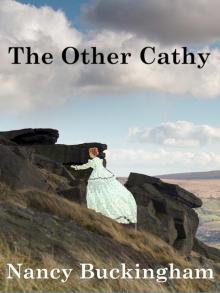 The Other Cathy
The Other Cathy Design for Murder
Design for Murder Valley of the Ravens
Valley of the Ravens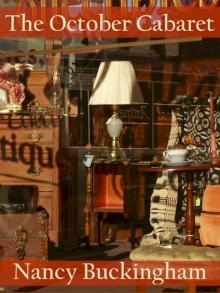 The October Cabaret
The October Cabaret Model Murder
Model Murder Murder in the Cotswolds
Murder in the Cotswolds Deadly Deceit
Deadly Deceit Return to Vienna
Return to Vienna Shroud of Silence
Shroud of Silence The Silver Castle
The Silver Castle A Cotswolds Legacy
A Cotswolds Legacy Marianna
Marianna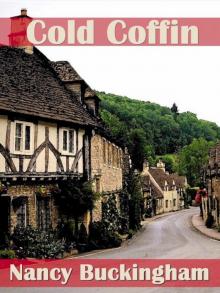 Cold Coffin
Cold Coffin Kiss of Hot Sun
Kiss of Hot Sun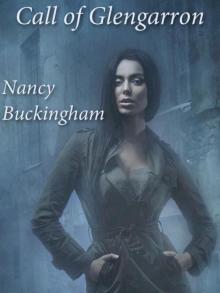 Call of Glengarron
Call of Glengarron Quest for Alexis
Quest for Alexis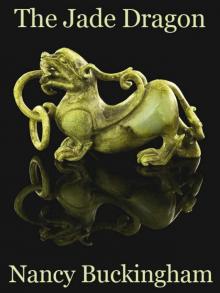 The Jade Dragon
The Jade Dragon